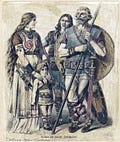A common set of moral and ethical standards have arisen within the adherents of the Germanic Faith, particularly among the members we could reasonably describe as belonging to the “Folkish” variety subject around the idea of “family values”. While I would not argue that these values are not of immense importance and central to the Germanic Faith, I would argue that the common perception of them is more than a little tainted by uninvestigated assumptions derived from a common Christian (and particularly low Protestant) background inevitably common amongst a religion containing so many recent converts.
Especially in the Anglosphere, the concept of “family values” takes a particularly political dimension that is not easily separable from the ethical worldview of Christian adherents, and which biases many otherwise totally sincere Heathens towards holding values and propositional assumptions which are not meaningfully connected at all to the faith of our forefathers. A good example of this is the controversial existence and debate surrounding the practice of Germanic polygamy and the obvious implications of an equally chaste monogamous family structure and its ethical implications.
To put it in clear and concise terms, many heathens think that monogamy is “good and right” in a way that is supported by their religion itself, and which I would argue is historically invalid and contrary to the beliefs and values of our actual pagan ancestors. We may start the examination of the historical evidence of Germanic polygamy through the references to it contained within the family sagas of Iceland.


